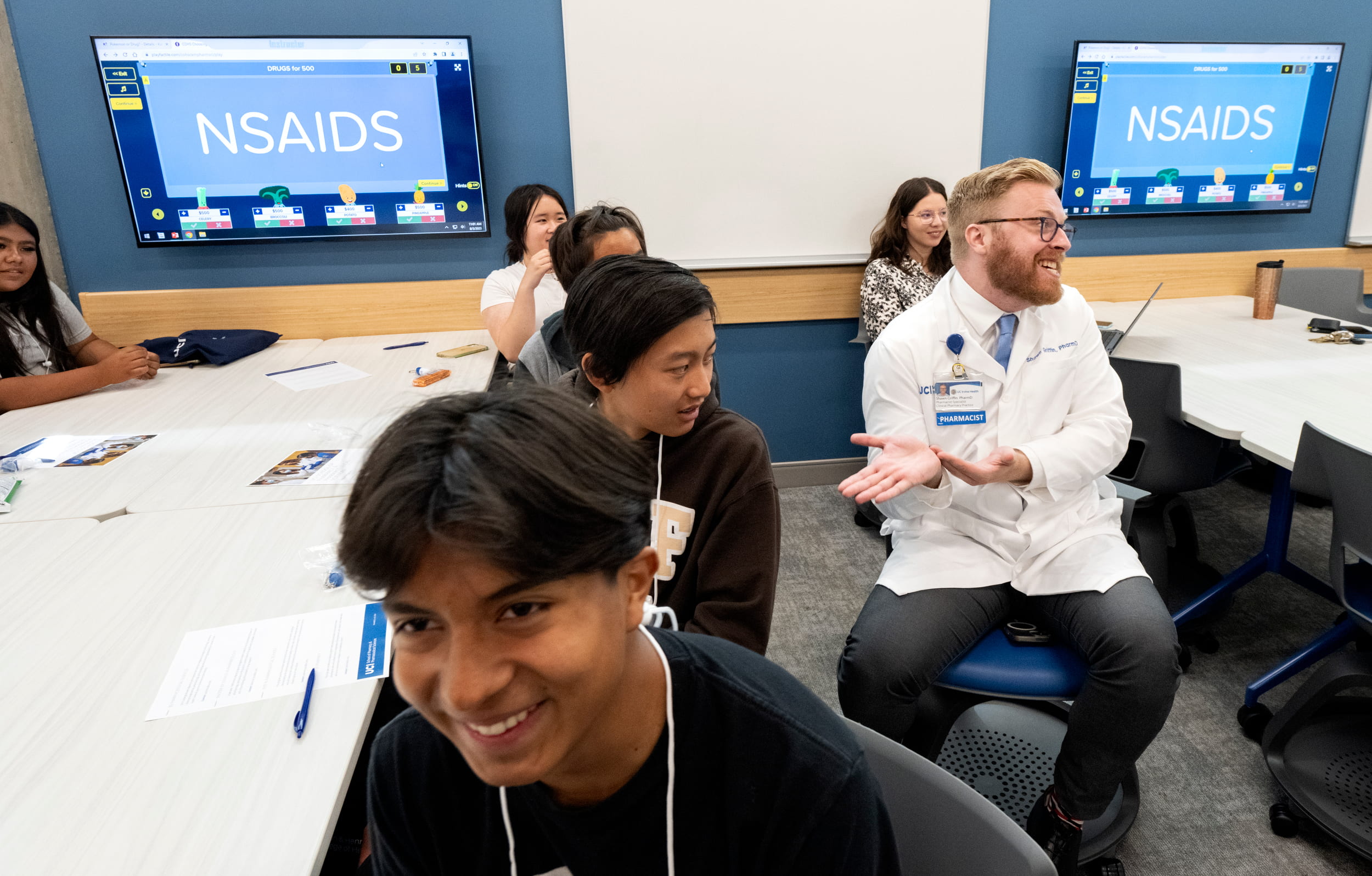University of California, Irvine: Pioneering Transformative Healthcare Initiatives
Rather than enjoying one of their last days of summer break, 150 Orange County high school students boarded buses at 7 a.m. to spend Aug. 3 at UCI’s Susan & Henry Samueli College of Health Sciences exploring a range of roles, programs, degrees and careers in healthcare.
Hosted by faculty and staff from the Health Affairs Interprofessional Education and Practice Collaborative and the Center for Educational Partnerships as part of the Early Academic Outreach Program, the Choosing a Major Conference drew sophomores, juniors and seniors from county high schools.
“At UCI, we are educating a future healthcare workforce that will be both diverse and reflective of the communities in which service will be offered,” said Dr. Steve Goldstein, vice chancellor for health affairs. “Our goal is to provide care that is patient-centered, attentive to the whole person, data-driven and team-based. In true One Health fashion, faculty from across the College of Health Sciences – including nurses, doctors, pharmacists and public health experts – came together to devise a well-rounded learning experience for the EAOP students and introduce them to the many career opportunities available in healthcare.”
The UC systemwide Early Academic Outreach Program is designed to more effectively help students at underserved schools prepare for college and the workforce. Selecting a major is one of the most momentous decisions high schoolers will make. This event gave them the chance to interact with faculty and undergraduates to gain strategic guidance on academic preparation, as well as discover professions they may not have known existed.
“This conference is a critical milestone in our work to support first-generation, low-income and underrepresented student pathways into health careers,” said Stephanie Reyes-Tuccio, UCI assistant vice chancellor for educational partnerships. “Our goal is to help break the barriers preventing matriculation, inspire and empower students, and communicate that these goals are not only realistic but tangible. By expanding the professions that students envision for themselves, we are planting the seeds for a growing and diversifying healthcare workforce for the state.”
Bubbles, Mad Libs and more
Students were divided into four groups and rotated among presentations by UCI students, faculty and staff from the schools of medicine, nursing, and pharmacy and pharmaceutical sciences, as well as the Program in Public Health. They also visited the Susan Samueli Integrative Health Institute’s Mussallem Nutritional Education Center.
To show the high schoolers that college classes involve more than just lectures, reading assignments, lab work and exams, each rotation included an interactive event that gave them a glimpse into the lighter side of higher education.
The Program in Public Health featured a bubble-blowing activity demonstrating how germs spread in an outbreak. Students were able to visualize and experience how COVID-19 became a global pandemic.
Performing surgery requires manual dexterity, and future M.D.s had the chance to practice their suturing and knot-tying skills, practicing various techniques on layered silicon pads designed to simulate human skin.
In the pharmacy and pharmaceutical sciences rotation, students showed off their science knowledge in a “Jeopardy!”-type game with categories such as biology, chemistry, drugs, physiology and pharmacology, followed by a lighthearted Mad Lib exercise spoofing a conversation between a pharmacist and a patient about new medication. The final activity was a true-false quiz on whether a displayed word named a drug or a Pokemon character.
The nursing event, a basic vital signs boot camp, took place in the state-of-the-art simulation lab. Attendees were taught how to measure blood pressure, temperature and pulse rate, then put that knowledge into bedside action on lifelike mannequins.
The Mussallem Nutritional Education Center is the classroom for the culinary medicine elective. Visiting students learned about good nutrition habits, including following a diet focused largely on fruits, vegetables, whole grains and healthy fats, as well as adopting a mindful eating approach to food. They prepared healthy energy bites and also saw the small patio garden where basil, mint, chamomile, rosemary and other herbs are grown for making tea or flavoring food.
These interactive exercises proved to be quite popular with the students, who said they were very “engaging” and “made the experience much more fun.”
Continuing the EAOP connection
After the rotations, question-and-answer panel sessions let attendees ask specific questions about the application process, financial aid and how to adjust to college life. They also heard personal stories about choosing a major, deciding on a particular career and reasons for attending UCI.
At the end of the day, students shared what they felt was the most important thing they had learned. Some said that the conference had confirmed their desire to go into a specific field, while others appreciated discovering the expansive range of available careers and learning how they could pursue them.
The conference is not the end of the EAOP connection for the attendees. They will continue to receive support as they prepare for and apply to college, learn how to accomplish goals, participate in volunteer opportunities in their communities that align with their interests, and navigate educational routes as they embark on their journeys toward fulfilling healthcare careers.






